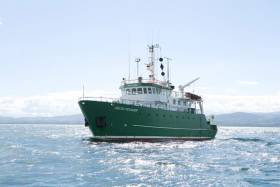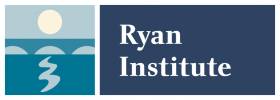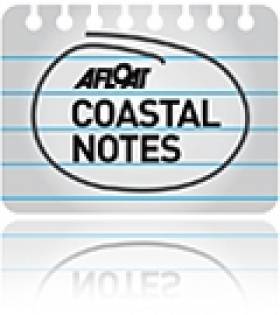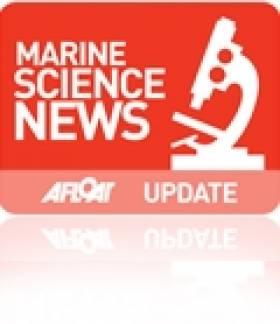Displaying items by tag: Ryan Institute
Scientists and students at NUI Galway’s Ryan Institute enjoyed a day trip on the Marine Institute’s research vessel RV Celtic Voyager on Friday (21 June) to take part in Ocean Sampling Day 2019.
Ocean Sampling Day is a simultaneous sampling campaign of the world’s oceans by scientists globally. It is organised by an EU consortium of marine research institutes, known as ASSEMBLE Plus, of which NUI Galway’s Ryan Institute is a partner.
Chief scientist Prof Louise Allcock, who is director of the Centre for Ocean Research and Exploration within the Ryan Institute, led a team of four experienced scientists and 11 marine science undergraduates who are in the first to third year of their studies.
Prof Allcock said: “We will sample and filter water from the ocean, and our filter papers, as well as those from other sites around the world, which will be sent to a molecular lab in a marine station in Greece where all the DNA on the filter papers will be sequenced to give an estimate of what bacterial and invertebrate species are present in the ocean.
“A healthy ocean has a wide variety of species, an unhealthy ocean less so — and hence we get an overview of our ocean health."
Sheena Fennell, one of the experienced scientists in the team who has spent extensive time at sea, explained the benefits to the undergraduate students joining the expedition.
“The students learn in their lectures all about the water column, the bacteria and invertebrates living therein, and the specialised gears that we use to sample, but this is an opportunity for them to get genuine hands-on experience while contributing to an international research project.”
The science team sampled directly above the SmartBay SubSea Cabled Observatory in Galway Bay.
Prof Allcock spoke of the importance of this site to the project: “The SmartBay Observatory provides subsea data all year round which means there is an enormous environmental dataset to complement our physical samples.
“Taking our samples from here also affords us the opportunity to highlight this impressive infrastructure to our European colleagues.”
The Marine Institute is also entertaining a group of third-level students as part of the 2019 Summer Bursary Programme.
Coming from a variety of disciplines across seven academic institutions, the students will gain experience in various fields of marine science including marine fisheries, aquaculture, communications, archiving, ecology, chemistry and catchment research in placements running between eight and 12 weeks.
“The work experience programme enables students from a wide variety of disciplines to further their knowledge and research in their particular area of interest,” said Helen McCormick, programme co-ordinator and senior laboratory analyst at the Marine Institute.
“It also offers students the opportunity to expand their professional networks, by meeting fellow students from other universities as well as work with experts in the their field and across the marine sector.
"Previous bursars have gained various positions within the Marine Institute at all grades up to and including director level.”
While many of the bursars will be based in the laboratories and offices at the Marine Institute’s headquarters in Oranmore, some students are also stationed at the catchment research facility in Newport, Co Mayo, where they will work with salmonids and eels, while others will be based in Castletownbere, Co Cork sampling fish and shellfish catches.
A number also took part in SeaFest 2019, Ireland’s national maritime festival, which took place from 7-9 June in Cork.
Fire Damage To Connemara Shellfish Research Base
#Connemara - Galway Bay FM reports that a shellfish research centre in Connemara was damaged in a fire earlier this week.
The blaze broke out in a section at the centre in Carna dedicated to studying the control of sea lice in salmon farms.
The facility is part of NUI Galway’s Ryan Institute, the university’s hub for environmental, marine and energy research.
New Radar System Could Improve Coastal Forecasts
A new radar system in Galway could help predict extreme weather events more accurately, The Irish Times reports.
Scientists at NUI Galway's Ryan Institute, in collaboration with the IBM Smarter Cities Technology Centre in Dublin, have installed the system on the shoreline in Galway Bay.
The system - the first of its kind in North Atlantic Europe - consists of two antennae, on Mutton Island and Spiddal, which scan the surface of the bay every half hour.
It then sends high-resolutions maps of surface currents and details of wave height and direction directly to the scientists' base at the NUIG campus.
The data is used, along with meteorological data, to develop models for forecasing marine conditions from tidal currents to storm surges - common on the challenging coastline around Galway Bay and the Aran Islands.
Moreover, the system is set to benefit the local community and beyond as the data, when completed, will be made freely available.
Silicon Republic says that the Galway Bay Coastal Observing System (GalCOS) could be used by sailors, fishermen and tourists to more accurately assess conditions in the area.
It could also be of use to local authorities in terms of providing details on the best time to release effluent while minimising environmental damage.
“This type of predictive modelling is critical to our Smarter Cities agenda," said IBM's Dr Lisa Amini, "and the findings can be widely applied to protect coastal cities and their environments."
Irish Lead Mission to Find New Life on the Ocean Floor
An Irish-led marine research mission has set off to discover strange new lifeforms that inhabit the deepest parts of our oceans.
In collaboration with scientists from the UK’s National Oceanography Centre, the team sailed from Galway earlier this week bound for the Mid-Atlantic Ridge to investigate life at 3,000m below the surface of the sea.
Using a remotely operated vehicle (ROV) they will explore for the first time the 45o North MAR hydrothermal vent field, where vents spew mineral-rich seawater heated to boiling point in the earth’s crust. These are home to a rich variety of marine life that thrives in complete darkness on bacteria fed by chemicals.
Patrick Collins from NUI Galway’s Ryan Institute will lead Ireland's marine biological team investigating this unique ecosystem, which could tell us not only about how life might have evolved on other planets, but may also be a rich source of new biochemical processes with valuable medical and industrial applications.
"There is potential here to put Ireland on the global map as a serious player in deep sea science," said Collins. "This is all the more timely with the exploitation of deep sea and hydrothermal vents for precious metals and rare earth minerals now a reality.”
The mission carries geochemists, marine biologists, marine geologists, marine geneticists and technicians from Ireland and the UK as well as a three-person TV crew from National Geographic.
They will spend 25 days at sea and will be posting a regular blog on scientistsatsea.blogspot.com.



























































